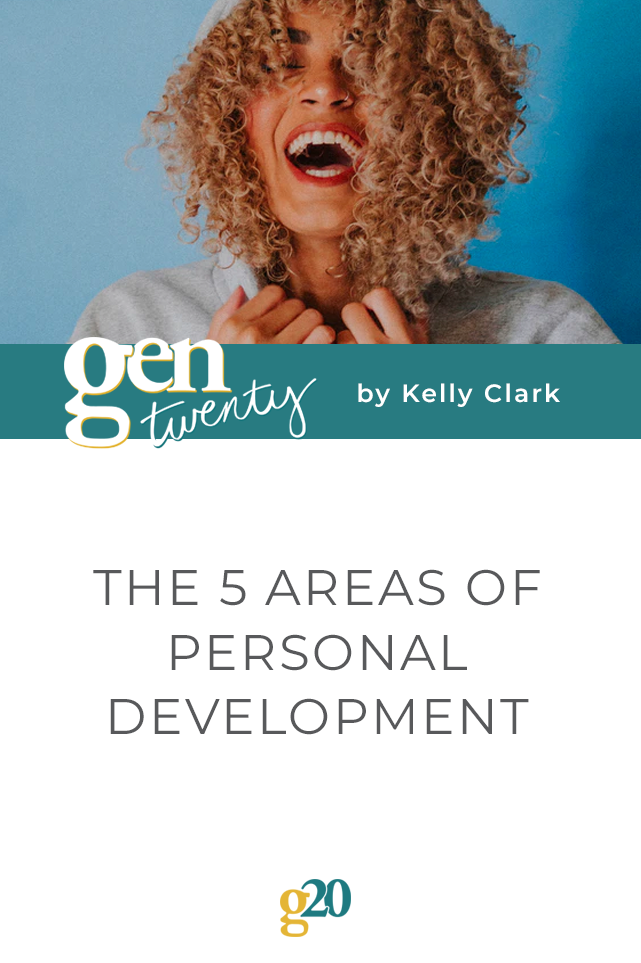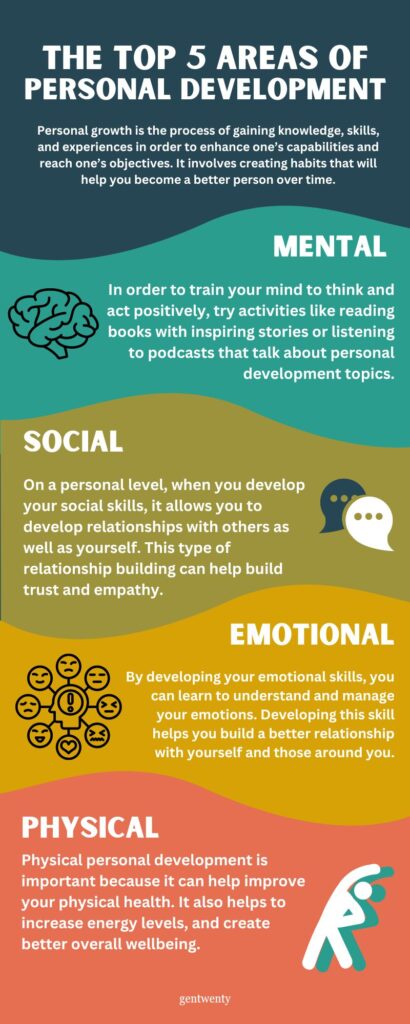How familiar are you with personal development? Is it something that you partake in regularly? Or are you wondering what I’m even talking about?
Whether you are the former, the latter, or somewhere in between, this post will either help you level up your personal growth, or help you begin your personal development journey.
5 Areas of Personal Development For Growth
Let’s first start with what personal development is. It’s a very broad subject. The Business Dictionary defines it as, “The process of improving oneself through such activities as enhancing employment skills, increasing consciousness and building wealth.”
For me, personal development can be anything that helps you go after your best self.
Personal growth is the process of gaining knowledge, skills, and experiences in order to enhance one’s capabilities and reach one’s objectives. It involves creating habits that will help you become a better person over time.
There are several different topics within the personal development world, but they all seem to fall under five major categories.
It’s important to note that personal development is something that requires dedication, time, and effort. It’s not something that will happen overnight.
The five categories are mental, social, spiritual, emotional, and physical.
In this blog post we are going over each of these categories in depth. You’ll learn why each category is important to your growth as a person and how to develop new skills and nurture existing ones within these categories.
Stick around to learn how to add personal development into your life, no matter how busy your day is.

1. Mental Development
The first of the five areas of personal development is all about growing your mind. You can partake in many mental personal development activities.
Why is mental development important for personal growth? The answer is simple: your thoughts dictate your actions, and what you think about yourself has a big impact on how successful you become.
In order to train your mind to think and act positively, try activities like reading books with inspiring stories or listening to podcasts that talk about personal development topics.
You can also challenge yourself by tackling difficult puzzles and brain-teasers; this type of activity will help you develop problem-solving skills and increase your intelligence.
Some more examples include:
- taking a class
- reading a nonfiction book
- watching an informational YouTube video to improve your skills
By setting aside some time each day, or each week, you can see growth in your career, increased productivity, and so much more.
My favorite activities to do in this personal development category are reading books on my industry, listening to podcasts, and taking courses.
Earlier this year I took the Social Media Marketing course, over at HubSpot Academy, and I was able to get a certification from it.
You can easily fit mental development into your day by listening to podcast on walk, working through a course 30 minutes at a time, or reading 10-20 pages of a book each night while taking notes.
Do you already prioritize mental personal development in your life? If so, what activities do you enjoy doing?

2. Social Development
This category is all about improving your communication. In my opinion, this category is the most overlooked. However, social personal development is an important activity to practice.
Why is social development important?
Having strong communication skills can help you both professionally and personally. If you are looking for a job, knowing how to talk to people in an effective manner will be beneficial during the interview process. Knowing how to socialize with your co-workers is also important because it helps build relationships that could lead to great opportunities down the line.
On a personal level, when you develop your social skills, it allows you to develop relationships with others as well as yourself. This type of relationship building can help build trust and empathy.
So how do you go about developing your social personal development skills?
There are many ways to do this. For example:
- Make an effort to reach out and talk to people more
- Volunteer and join clubs to help expand your network
- Develop your public speaking skills
- Take a class on communication or conflict resolution
- Practice active listening
Learning a new language, practicing your public speaking skills, and committing to doing more active listening are all activities that can help with social personal development.
No matter what activity you choose, developing your social skills will take time. You won’t be able to master them overnight. But with practice, you can become more confident in social situations.
When was the last time that you did any of these activities? If it has been a while I want to challenge you to pick at least one to do this week.
Do you prioritize developing your social skills? What activities do you practice to help with this area of personal development? Share in the comments!

3. Spiritual Development
Spiritual personal development can mean something different for each person. The best way that I know how to describe it is anything that brings you peace and helps you connect to your true self.
Why is spiritual development important?
Developing your spiritual self can help you improve your mental and emotional wellbeing. It helps you to focus on the positive aspects of life, which is important in this busy world.
It also helps to give clarity when making decisions, as well as peace of mind when facing difficult times.
So how do you get started with spiritual personal development?
The activities that fall under this category can be anything from spending time in prayer and reading your Bible, to taking a nature walk or meditating. For more examples check out this article.
During my spiritual personal development time I like to participate in a Bible study or connect with people from my church. Discussing the message from the sermon on Sunday fills my cup up unlike anything else can.
Other examples of spiritual development include:
- Participating in a yoga class
- Taking a nature walk
- Reading spiritual books for inspiration
- Writing out your thoughts and feelings
No matter what activity you choose, make sure that it is something that makes you feel connected to yourself and the world around you.
Spending time in spiritual development activities should be part of each week because it helps to keep you grounded and focused.
Do you currently have spiritual personal development activities in your life? What activities do you enjoy doing for your spiritual life? If so, leave a comment and let me know what those activities are!

4. Emotional Development
Emotional personal development can be, well, emotional. Because of this it can be easy to brush it off. I’ve done my share of doing this. I have realized that it wasn’t healthy behavior.
The reality is that holding in your emotions, and brushing them off, only makes it worse when they finally do come out. Developing your emotional intelligence will help you in every area of your life to reach your full potential.
Why is emotional development important?
By developing your emotional personal development skills, you can learn to understand and manage your emotions. Developing this skill helps you build a better relationship with yourself and those around you.
It also helps to increase self-esteem and confidence, as well as make it easier to navigate difficult conversations or situations. It’s important to remember that there is no one-size-fits all solution when it comes to emotional development.
So how do you go about developing your emotional skills?
The activities that fall under this category can be anything from talking to a therapist, reading books on emotions and understanding yourself better, journaling or practicing mindfulness.
For me, I find that taking some time each week to journal helps me to sort out my thoughts and feelings. It also allows me to track what I have learned about myself throughout the week.
Other activities you can practice for emotional development include:
- Recognizing your triggers
- Practicing self-care
- Learning to express yourself in a healthy way
- Working on understanding boundaries
- Talking to a therapist or mentor
- Journaling
- Talking to a friend
- Tracking your mood
No matter what activity you choose, make sure that it is something that helps you identify and process your emotions in a healthy way. You might not be able to master emotional development overnight, but with practice, you will start to see significant improvements.
Prioritizing your mental health is also part of emotional development. While a healthy body is important, a healthy mind is equally as important. Going to therapy is a great way to improve your personal life and help you reach your full potential and become the best version of yourself.
Remember, it is okay to not be perfect and take your time when it comes to developing your emotional self. Everyone has different needs and experiences. Take the time to find what works for you and commit to practicing it each week.
With practice, you can make significant improvements in your emotional development skills.
Are there any activities that you have found to be helpful in developing your emotional self? Share in the comments! It might help someone else who is on their own journey!
P.S. If you need a little extra support, know that you are not alone. Reach out to a friend or family member and ask for help if needed. You can also check out books or blogs about emotional development that might be helpful.
5. Physical Development
We’ve made it to our last of five categories!
By now I hope you are seeing that personal development, practiced right, is all about the whole self. We aren’t only focusing on one aspect of you here. That will be important to note when it comes time to choose your personal development activities.
Physical personal development is about a lot more than exercise.
Why is physical development important?
Physical personal development is important because it can help improve your physical health. It also helps to increase energy levels, and create better overall wellbeing.
Not only that, but the activities you choose to practice this category can also be used as stress relief outlets when things feel overwhelming.
So how do you get started with physical personal development?
The activities that fall under this category can include anything from going for a walk, joining a yoga class or gym, or even just taking some time to stretch.
For me, I like to take my dog on a walk each day and practice yoga before bed. It helps me feel focused, energized and relaxed at the same time.
Other examples of physical development activities include:
- Running or jogging
- Going for a hike
- Joining an exercise class
- Taking part in a sport
- Lifting weights
- Practicing yoga or stretching
No matter which activity you choose, make sure that it is something that is enjoyable and fits into your lifestyle. It’s also important to take breaks when needed and listen to your body in order to avoid overexertion.
You’ll also want to consider eating and sleeping habits, to name a few, to get the full picture of this category. Some activity examples include working out, getting 7-9 hours of sleep each night, meal prepping, and going to regular checkups at your doctor’s office.
By creating healthier habits around exercise, healthy eating, and sleep you will be on your way to be your best physical self.
What is your favorite physical personal development activity and why is it your favorite? Do you currently have physical personal development activities in your life? What activities do you enjoy doing for your physical wellbeing? We would love to hear what those activities are! Leave a comment below and let us know.

Setting Personal Development Goals For Yourself
The first step was learning about the areas of personal development. The second step is setting personal goals so you can make an action plan. Goal setting can feel overwhelming, so the good news is if you have a hard time with it, we’ve got you covered here.
When setting personal development goals for yourself, make sure that they are realistic and achievable. It’s also important to track your progress. This will help keep you motivated and on track with your progress.
How familiar are you with personal development? Is it something that you partake in regularly? Or are you wondering what I’m even talking about?
Whether you are the former, the latter, or somewhere in between, this post will either help you level up your personal growth, or help you begin your personal development journey.
Here are some tips for setting personal development goals:
- Start small. Don’t put too much pressure on yourself by aiming too high. Start small and work your way up as you progress.
- Set SMART goals. SMART goals (an acronym) can help us development important skills for professional success, but can also be a useful tool in all aspects of your life.
- Write down your goals and plans. Having a written plan makes it easier to stay on track.
- Break it down into achievable steps. Knowing the individual steps needed to reach a goal can be very motivating, and make each step feel more attainable.
- Aim for progress, not perfection. It’s perfectly fine to make mistakes, and even have setbacks along the way. Acknowledge your progress and celebrate each step forward.
- Get support from others. No one can do it alone! Connect with friends or family who can help cheer you on in your journey.
- Find a mentor or teacher who can guide you on your path. They can provide valuable insight and tips that will help you reach your goals faster.
- Adjust your goals if necessary. If it’s not working, adjust it! Don’t be afraid to tweak your plans until they are just right for you.
By following these tips, you will find that setting personal development goals is an achievable and rewarding process.

How To Add Personal Development Into Your Day – Developing Your Personal Development Plan
Now that you know what personal development is, and what it encompasses, you probably want to know how to fit it into your day, right?
Here are two ideas ways to incorporate personal growth into your day, but there are many more. I would suggest listing out any activities you can think of for each of the categories and then figure out which ones can fit into your day/week. Experiment and have fun with it.
The Idea of the Morning Miracle or Power Hour
Incorporating everything at once can feel overwhelming to say the least. That’s where the idea of the morning miracle or the power hour comes into play.
This concept involves dedicating 1 hour per day to yourself. This comes down to just 7 hours per week – not even a full work day!
You start by breaking 1 hour down into 5 equal parts. Essentially you’ll dedicate 10-12 minutes each day to each of the 5 areas of personal development.
Here’s an example of a power hour breakdown:
- Minutes 0-12: Yoga and stretching session from a YouTube video (physical development)
- Minutes 13-24: Journaling your thoughts, feelings, and experiences from the previous day (emotional development)
- Minutes 25-36: Doing a page in your devotional (spiritual development)
- Minutes 37-48: Send a networking email or call your parents (social development)
- Minutes 49-60: Read 12 pages of a nonfiction book (mental development)
Rotating Weekly Schedule Example:
If you feel like trying to work on all five areas of personal development is too much, try separating them into themed days.
Here is an example:
- Monday: Mental
- Tuesday: Social
- Wednesday: Your choice/ a mix of different ones
- Thursday: Emotional
- Friday: Physical
- Saturday: Your choice/ mix of different ones
- Sunday: Spiritual
Tips For Adding More Personal Development into a Busy Day:
If your day is already packed and you have no idea how to add personal development, try this.
Each of these either takes minimal time or can be done while doing something you already planned.
Here are some easy examples of ways to incorporate more from your personal development goals into your everyday life:
- Mental: Listen to a podcast on your commute to work, shameless plug, the GenTwenty podcast is full of short, but motivational and informational discussions.
- Social: Instead of going solo on your lunch break, why not ask a co-worker or friend to join you? While at lunch practice actively listening. Positive Psychology has some great tips that you can use.
- Spiritual: Begin your day with a short devotional or five minutes of meditating before getting ready for work.
- Emotional: End your day by journaling. You can reflect on your day or use a journal prompt. Whatever comes into your mind is a great place to start.
- Physical: A common misconception is that working out has to take hours to be effective. Sometimes long workouts can be a good thing. However, it is impossible to do when you have a busy day. Don’t completely skip your workout because of this. Instead find a short workout routine or to incorporate exercise throughout your day.
Now that you see exactly what personal development entails, and how to make it fit into your life, how are you going to incorporate it into your life?
- Start small. Don’t put too much pressure on yourself by aiming too high. Start small and work your way up as you progress.
- Write down your goals and plans. Having a written plan makes it easier to stay on track.
- Break it down into achievable steps. Knowing the individual steps needed to reach a goal can be very motivating, and make each step feel more attainable.
- Aim for progress, not perfection. It’s perfectly fine to make mistakes, and even have setbacks along the way. Acknowledge your progress and celebrate each step forward.
- Get support from others. No one can do it alone! Connect with friends or family who can help cheer you on in your journey.
- Find a mentor or teacher who can guide you on your path. They can provide valuable insight and tips that will help you reach your goals faster.
- Adjust your goals if necessary. If it’s not working, adjust it! Don’t be afraid to tweak your plans until they are just right for you.
By following these tips, you will find that setting personal development goals is an achievable and rewarding process.
